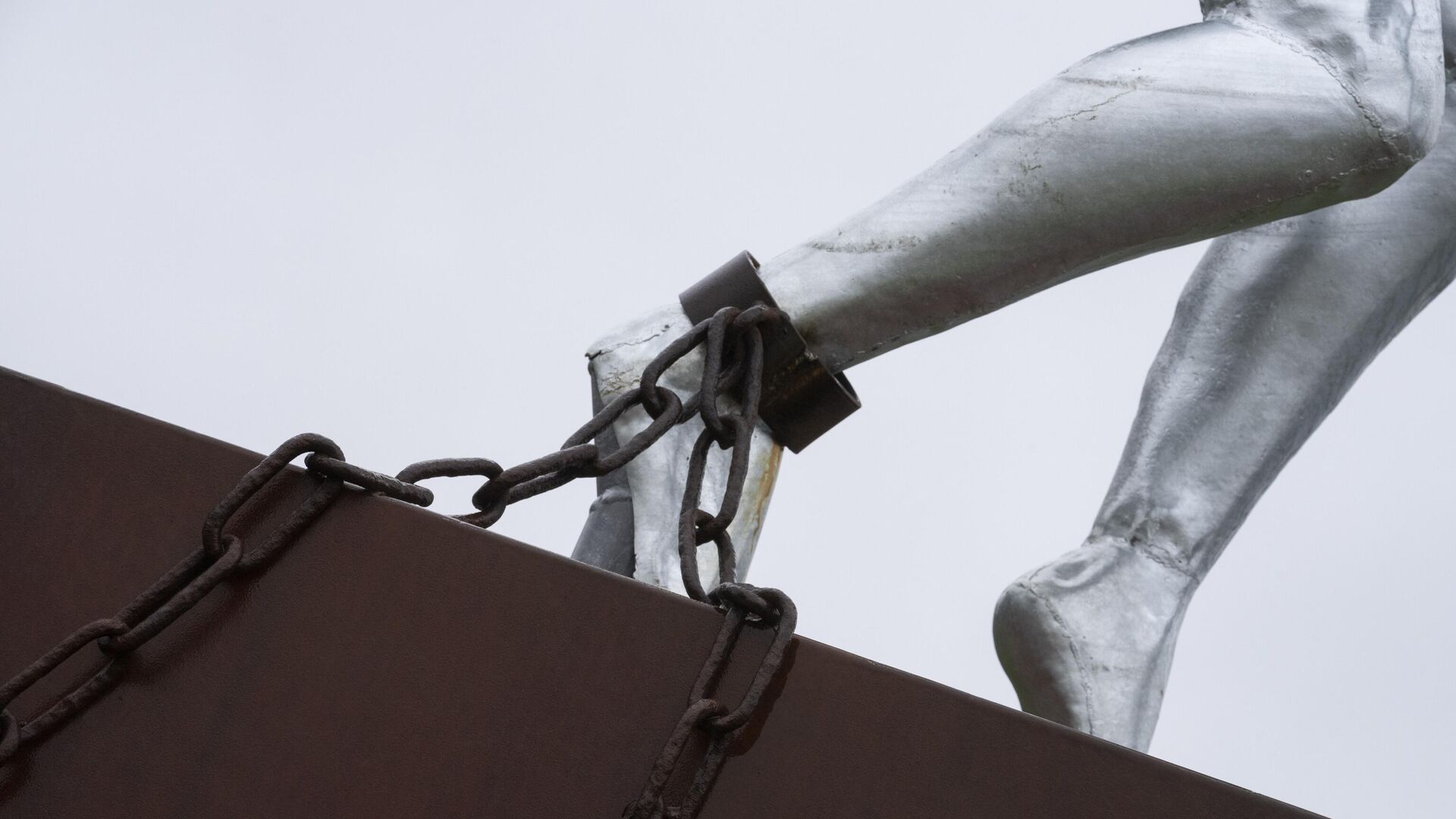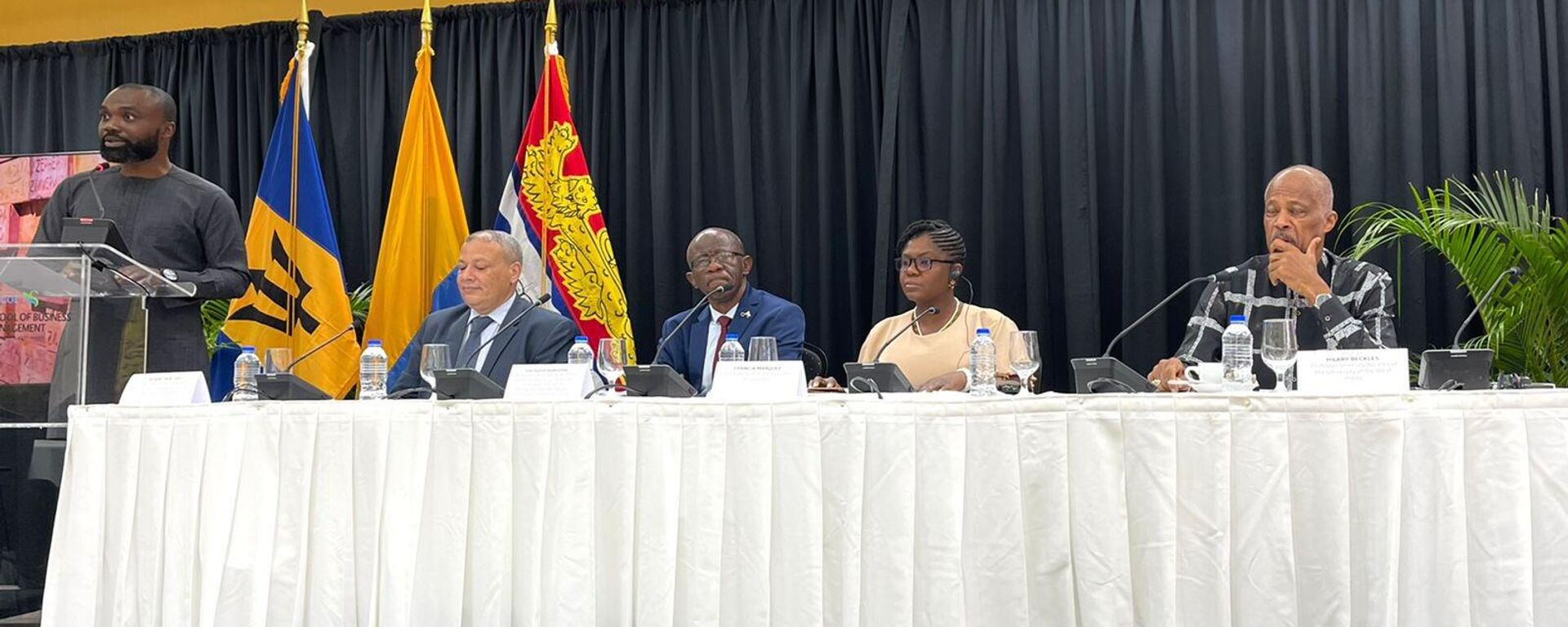https://en.sputniknews.africa/20230921/global-support-is-needed-to-make-western-countries-admit-guilt-for-years-of-enslavement-expert-says-1062260011.html
Global Support Needed for West to Acknowledge Slavery Guilt, Expert Says
Global Support Needed for West to Acknowledge Slavery Guilt, Expert Says
Sputnik Africa
The United Nations published a report on Tuesday calling on former colonial powers, particularly in the West, to address the legacies of the years of... 21.09.2023, Sputnik Africa
2023-09-21T15:14+0200
2023-09-21T15:14+0200
2023-09-22T07:34+0200
rishi sunak
namibia
west
united states (us)
united nations (un)
north atlantic treaty organization (nato)
sputnik africa
climate
climate change
reparations
https://cdn1.img.sputniknews.africa/img/07e7/05/1a/1059501428_0:0:3073:1728_1920x0_80_0_0_9f1d1bb77e0f8cc64c2cc737b71c3f96.jpg
More global support is required to raise demands about the impact of colonialism on Africa in order to make these countries "admit the guilt" and take remedial actions, the founding chief director of the Institute for Economic Research on Innovation at the University of Technology of South Africa Tshwane Rasigan Maharajh, told Sputnik Africa.However, speaking about the plausibility of the Western reparations for Africa, the expert argued that it is "implausible" and "improbable."Moreover, the professor noted that there is so far no evidence of the UN "confronting hegemonic powers, including the Group of 7 (G7) and the North Atlantic Treaty Organization (NATO)."Noting that talk about compensation for years of African enslavement is not new, Maharajh added that there was no response from the political entities and companies on the matter.Explaining why the West is unlikely to address its past legacies, the expert underlined that countries will not collectively admit guilt because of the temporal gap between those who actually benefited from colonial practices and slavery and their ancestors.In addition, Maharajh pointed out the difficulty of identifying those who should be brought to justice, "other than through the records of the transactions through which people were sold." Nevertheless, he stressed that "more reports [about the consequences of slavery] emerging with global consensus supporting the view" may help to mobilize Western civil society.As for the ways to hold the West responsible for the African enslavement, the researcher, citing the case of Germany and Namibia, noting that it is crucial to "ensure that those societies that lost people to slavery through colonization and all imperialism, are actually included in the discussions about reparations and compensation"Furthermore, commenting on the "unfairness" towards African nations, he recalled that recently, UK PM Rishi Sunak announced that "no compensation will be forthcoming from the UK." According to the expert, this corresponds with what the US Special Presidential Envoy for Climate John Kerry declared: "that there is no climate debt owed by certain countries to others."In the report from September 19, the UN asked Western countries to provide African people with financial compensation for years of colonialism and enslavement. Apart from reparations, the report suggested other measures to tackle the lasting consequences of enslavement, including a public apology, medical and psychological rehabilitation, and guarantees of non-repetition as forms of settlement.In late July, representatives of a diverse array of African and Caribbean organizations held talks in the Barbados capital Bridgetown on reparations for slavery, Jamaica's University of the West Indies (UWI) stated. The university added that the meeting included "critical reflection on addressing harms suffered within Africa and throughout the Diaspora."Last June, Barbados Prime Minister Mia Amor Mottley publicly called for Europe to pay reparations to enslaved countries.On Wednesday, Ghanaian President Nana Akufo-Addo said during a speech at the UN General Assembly (UNGA) that reparations should be paid by those who engaged in the transatlantic slave trade in Africa.
https://en.sputniknews.africa/20230728/african--caribbean-nations-focus-slavery-reparations-in-international-summit--1060850408.html
namibia
west
united states (us)
colombia
Sputnik Africa
feedback@sputniknews.com
+74956456601
MIA „Rossiya Segodnya“
2023
Rasina Musallimova
https://cdn1.img.sputniknews.africa/img/07e7/0a/17/1063019139_0:0:646:646_100x100_80_0_0_348c74b69cf86748a53875f8148a2f85.jpg
Rasina Musallimova
https://cdn1.img.sputniknews.africa/img/07e7/0a/17/1063019139_0:0:646:646_100x100_80_0_0_348c74b69cf86748a53875f8148a2f85.jpg
News
en_EN
Sputnik Africa
feedback@sputniknews.com
+74956456601
MIA „Rossiya Segodnya“
Sputnik Africa
feedback@sputniknews.com
+74956456601
MIA „Rossiya Segodnya“
Rasina Musallimova
https://cdn1.img.sputniknews.africa/img/07e7/0a/17/1063019139_0:0:646:646_100x100_80_0_0_348c74b69cf86748a53875f8148a2f85.jpg
rishi sunak, namibia, west, united states (us), united nations (un), north atlantic treaty organization (nato), sputnik africa, climate, climate change, reparations , compensation, british colonialism, colombia, slavery, africa insight
rishi sunak, namibia, west, united states (us), united nations (un), north atlantic treaty organization (nato), sputnik africa, climate, climate change, reparations , compensation, british colonialism, colombia, slavery, africa insight
Global Support Needed for West to Acknowledge Slavery Guilt, Expert Says
15:14 21.09.2023 (Updated: 07:34 22.09.2023) The United Nations published a report on Tuesday calling on former colonial powers, particularly in the West, to address the legacies of the years of colonialism and enslavement by taking concrete measures, including financial compensation for African nations.
More global support is required to raise demands about the impact of colonialism on Africa in order to make these countries "admit the guilt" and take remedial actions, the founding chief director of the Institute for Economic Research on Innovation at the University of Technology of South Africa Tshwane Rasigan Maharajh, told Sputnik Africa.
"We need more global support for civil society to mobilize inside the countries of the collective West through that increased awareness about the consequences of their action and ensure that we support protests that take place inside those countries, demanding that their enterprises, individuals and the countries as a whole actually admit the guilt and thereby accept the remedial action as well," he said.
However, speaking about the plausibility of the Western reparations for Africa, the expert argued that it is "implausible" and "improbable."
"It's highly implausible and therefore improbable that either the collective West or the individual entities that benefited from profiting off unfree labor will be expected to pay back the compensation for the unfair stealing of the wealth to people themselves," the researcher explained.
Moreover, the professor noted that there is so far no evidence of the UN "confronting hegemonic powers, including the Group of 7 (G7) and the North Atlantic Treaty Organization (NATO)."
Noting that talk about compensation for years of African enslavement is not new, Maharajh added that there was no response from the political entities and companies on the matter.
"It has had a long history. In 2016, the Office of the Human Rights Commission of the UN made a similar call. This call was then picked up again in 2019, especially as BlackLivesMatter and other mobilizations in the United States and elsewhere gained ground. Yet we have not seen a response from either the political entity representing the country or the individuals or the enterprises accepting responsibility for slavery," he stressed.
Explaining why the West is unlikely to address its past legacies, the expert underlined that countries will not collectively
admit guilt because of the temporal gap between those who actually benefited from colonial practices and slavery and their ancestors.
"This is at least 245 years, if not 500 years, of history. Across that time, the demography of the collective West has changed dramatically. In other words, those that occupy these territories today are quite far removed from those that practiced unfree labor, either through slavery or indentured systems of servitude," the researcher highlighted.
In addition, Maharajh pointed out the difficulty of identifying those who should be brought to justice, "other than through the records of the transactions through which people were sold."
Nevertheless, he stressed that "more reports [about the
consequences of slavery] emerging with global consensus supporting the view" may help to mobilize Western civil society.
"It's not that we are looking for individuals to be paid amounts of money. It's for collective remediation of a situation made untenable by the stealing of people and moving them across the planet," the expert added.
As for the ways to hold the West responsible for the African enslavement, the researcher, citing the case of Germany and Namibia, noting that it is crucial to "ensure that those societies that lost people to slavery through colonization and all imperialism, are actually included in the discussions about reparations and compensation"
"We cannot end up in a situation where an advanced, mature capitalist economy such as Germany decides it owes the peoples of Namibia an amount determined by the German government with no participation from Namibia itself. That's an example of where we are at present times," Maharajh said.
Furthermore, commenting on the "unfairness" towards African nations, he recalled that recently, UK PM Rishi Sunak announced that "no compensation will be forthcoming from the UK."
According to the expert, this corresponds with what the US Special Presidential Envoy for Climate John Kerry declared: "that there is no climate debt owed by certain countries to others."
"We really are facing a point where humanity itself needs to group together in solidaristic action, seeking this remedial action. It won't come about on its own without this act of instigation and support for these claims and making sure that the victims, the families of the victims and now across generations, people are able to participate in determining their own future," the researcher concluded.
In the report from September 19, the UN
asked Western countries to provide African people with financial compensation for years of colonialism and enslavement. Apart from reparations, the report suggested other measures to tackle the lasting consequences of enslavement, including a public apology, medical and psychological rehabilitation, and guarantees of non-repetition as forms of settlement.
In late July, representatives of a diverse array of African and Caribbean organizations
held talks in the Barbados capital Bridgetown on reparations for slavery, Jamaica's University of the West Indies (UWI) stated. The university added that the meeting included "critical reflection on addressing harms suffered within Africa and throughout the Diaspora."
Last June, Barbados Prime Minister Mia Amor Mottley publicly called for Europe to pay reparations to enslaved countries.
On Wednesday, Ghanaian President Nana Akufo-Addo said during a speech at the UN General Assembly (UNGA) that
reparations should be paid by those who engaged in the transatlantic slave trade in Africa.



